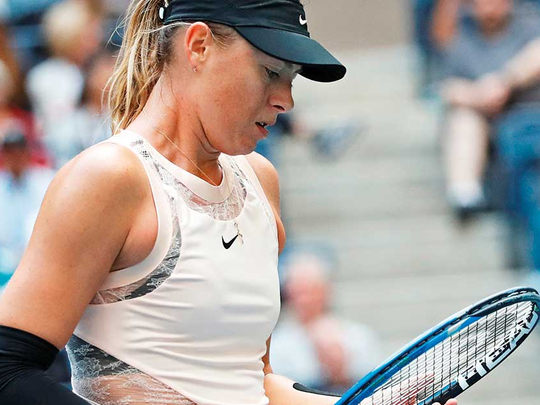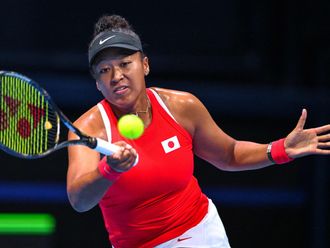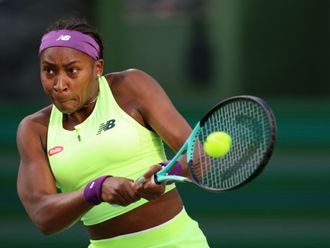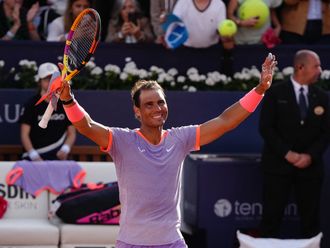
New York: Maria Sharapova’s outfit sparkled even if her play sometimes didn’t during her grand slam return at the US Open but the former world No. 1’s run to the fourth round showed she is back in business on and off the court.
Playing her first grand slam since returning from a 15-month doping ban, Sharapova proved a polarising presence at Flushing Meadows, feted by adoring fans but vilified in the small corners of the players’ locker room.
For television rights holders and the United States Tennis Association (USTA), seeing Sharapova’s name on the entry list was akin to winning the lottery, guaranteeing a bump in ratings and capacity crowds at the 23,000-seat Arthur Ashe Stadium.
With the tournament ravaged by injuries and withdrawals, the Russian’s return provided a splash of glitz and glamour.
She strolled onto floodlit Arthur Ashe as if on a catwalk, wearing a jet black dress that sparkled with Swarovski crystals for her opening match against Simona Halep and duly dumped the second seed out of the tournament.
Sharapova’s US Open ended with a 5-7 6-4 6-2 loss to Latvian Anastasija Sevastova on Sunday, but her week-long run will help polish the Russian’s tarnished brand.
“Sharapova’s doping transgression was not terribly egregious, neither performance-enhancing nor intentional, and her ban seemed unduly harsh,” Bob Dorfman of Baker Street Advertising said.
“I suspect that’s why Nike suspended their relationship, but did not drop her.
“And with their number one endorser Serena Williams off the court indefinitely, expecting her first child, Sharapova’s first grand slam event since her return is a grand opportunity for Nike to capitalise on America’s love for comeback performances.”
Not everyone at Flushing Meadows was enamoured with the comeback. While the fans welcomed her with open arms and standing ovations, there was a chill among a group of players who believe the five-time grand slam champion was accorded special treatment due to her profile and marketability.
Former world No. 1 Caroline Wozniacki, Halep and Canadian Eugenie Bouchard have been among the loudest dissenters.
Fifth seed Wozniacki blasted the USTA and Sharapova when she was relegated to a small outside court for her second round match while the 146th ranked Russian soaked up the applause on centre court.
“Who comes back from a drugs sentence, performance enhancing drugs and then all of a sudden gets to play every single match on centre court? I think that’s a questionable thing to do,” fumed Wozniacki. “It doesn’t set a good example.”
Hard feelings aside, even Wozniacki conceded she understood the business side of the sport and Sharapova’s place in it.
Her drug ban notwithstanding, Sharapova remains one of the world’s most recognisable athletes and could be set to regain her former corporate standing.
“Like most controversial athletes, Sharapova has staunch defenders, as well as those that revile her actions and what they have meant to the game,” David Carter, principal of the Sports Business Group, said.
“Between Nike’s culture and its history in accepting, if not defending athletes with indiscretions, it’s no surprise they are sticking with her for now.
“In order for her to regain widespread marketability, her performance will have to steadily improve over time, while any further unforced errors off the court would need to be eliminated.”
Sharapova was unable to deliver extended stretches of brilliant tennis at the US Open but there was every sign that the 30-year-old is set to climb back up the rankings and reclaim her spot as one of the best paid women athletes.
For 11 straight years, she topped the Forbes list before slipping to second last year and dropping from the list completely for 2017.
American Express, Avon and Tag Heuer did not renew their sponsorship deals with Sharapova, while retained arrangements with Nike, Head, Evian and Porsche included huge reductions while she was off the tour for over a year, Forbes reported.
Before her fourth round elimination, Baker Street’s Dorfman said a deep run at Flushing Meadows could return her marketability to “pre-ban levels.” “A grand slam win some time would be a tremendous feel-good story that could vault Sharapova into a bigger endorsement star than ever,” he added.












